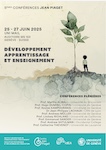Keynotes > Andreas MüllerAnalogies in Science and Science Learning:
The role of analogies in science and science learning as sources of insight, error, and intellectual satisfaction is illustrated by selected examples. I then focus on a special form of instructional analogy, worked examples, giving a brief account of their theoretical relationship. On this background, an empirical investigation that supports understanding of size and scale (USS) and order-of-magnitude reasoning (OMR) in secondary science teaching using worked examples is presented. These abilities are considered essential elements of scientific practice and literacy; however, their development faces significant barriers because they involve complex procedural skills and require acquisition of strategies for coordinating multiple reasoning steps. Additionally, transfer has been found unsatisfactory in many studies. A quasi-experimental repeated-measurement study comparing a worked example intervention group with a control group using conventional tasks was conducted within regular high-school science classrooms (same content, lesson plan, and teacher). Results reveal significant and practically relevant effects on students’ procedural and conceptual knowledge regarding USS and OMR, including near and far transfer. The contribution concludes with perspectives for classroom practice and further research, emphasizing the relation of worked examples to the wider framework of analogous reasoning. |


